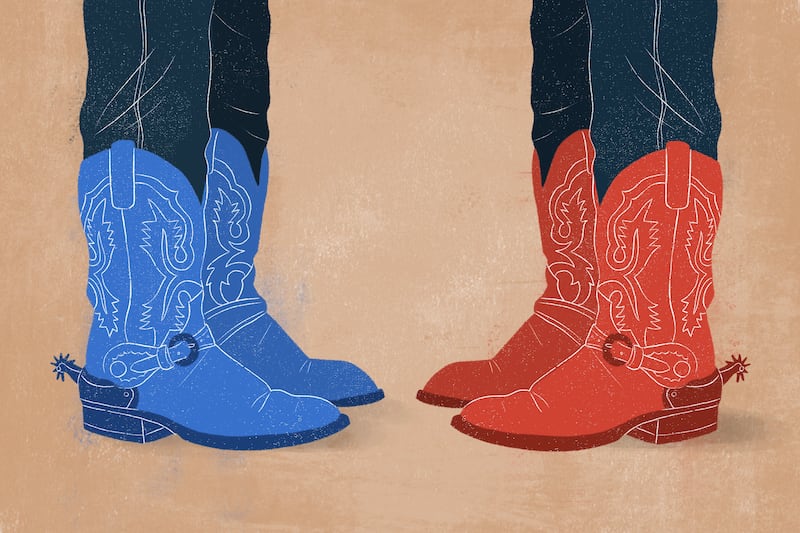The 2022 political season saw its fair share of ugly.
In Missouri, Eric Greitens ran an ad in which he broke into a house carrying a shotgun surrounded by guys in tactical gear, and said he was “hunting RINOs” — the term for “Republicans in name only.”
California Rep. Jimmy Gomez accused his challenger of being supported by MAGA Q-Anon believers; both Gomez and his opponent are progressive Democrats. Meanwhile, voters in Pennsylvania saw echoes of the infamous “Willie Horton” ad which played on racist fears.
In the face of these and other ads, political historians will warn against histrionics. They will note, with apologies to Thomas Hobbes, that political campaigns are nasty, brutish and long. The Adams-Jefferson presidential campaign of 1800 was notoriously awful. Among other things, a Jefferson-supporting pamphleteer (the social media disinformation machine of the day) claimed Adams was a hermaphrodite. The president of Yale University, an Adams supporter, said that if Jefferson were elected president, America’s wives and daughters would be subjected to legal prostitution. And of course politicians used to engage in actual duels.
American politics has never been for the faint of heart or thin of skin.
American politics has also been soaring and inspirational. A young Barack Obama proclaimed “... in no other country on Earth is my story even possible.” President Ronald Reagan told us it was “morning in America” and U.S. Sen. Ted Kennedy promised “the dream will never die.”
At the end of an acrimonious campaign season in which candidates pretended to be cowboys, accused each other of being foreign agents and predicted the apocalypse, it is worth pausing to highlight moments of dignity, decency and even the mundane.
Republican Brad Raffensperger was easily reelected secretary of state in Georgia. Raffensperger famously stood up to President Donald Trump in 2020 and refused to alter the election results. In the weeks before the 2022 election, Raffensperger said on “Meet the Press,” “I’m going to stand for the rule of law, and I’m going to buck my own party if I have to….”
Raffensperger is no moderate or shrinking violet. He is a proud conservative and Republican. He is also committed to doing his job fairly, even if that means that people with whom he disagrees win.
U.S. Sen. Mark Kelly of Arizona, a Democrat, won reelection after a close race with his opponent. His campaign consistently promoted public service. That is no surprise, given his military career, and the fact that he was an astronaut.
But Kelly’s ads also addressed local issues like water and jobs. He promoted voting and explained the process. Kelly’s videos were full of people talking and listening, appearing to have the sorts of conversations we all hope to have with our elected officials. There was nothing earth-shattering or shocking. What Kelly did not do also matters. He did not use his military background to talk about destroying his enemies. He didn’t brandish weapons or threaten anyone. He didn’t blow anything up. Kelly pitched himself as a good and decent guy who loves his state and his country.
In Utah, U.S. Senate candidate Evan McMullin, an independent, lost by a reasonably wide margin. No one was surprised by the result. Nevertheless, his campaign is worth celebrating. McMullin ran for the Senate on the premise that ideas should matter more than party labels. His campaign said, “here’s what I stand for, here’s what I believe in, support me or don’t on the merits.” He didn’t say “vote for my team” or “everyone who disagrees with me is evil.” Forty percent of Utah voters stood with him.
In his concession speech, McMullin warned about fear and demagoguery and reminded supporters that “the darker the clouds, the more clearly light and truth show a better way forward.” McMullin’s campaign is one from which all candidates can learn.
The groups most deserving of our praise this year, however, didn’t run for office. Those who most deserve our praise are election workers and voters.
The people who collect ballots and count votes, who check names, answer questions and give us “I voted!” stickers make democracy work. For the past several years, many of these men and women have been attacked and maligned. They have received death threats and been harassed. Nevertheless they showed up at the polls on Nov. 8 to do their jobs. They were the calm in the middle of a national political storm.
Finally, the tens of millions of Americans who voted deserve our applause. They voted for local, state and national candidates. They voted for friends and sometimes against neighbors. They voted for people in their own political party and sometimes crossed over to vote for candidates from other parties. Some votes were informed; others were guesses. All of those votes mattered. As long as people vote, and as long as those votes are counted and candidates accept the results, our democracy is in good shape.
I think I speak for most Americans in saying to politicians and political parties, take a few weeks off. Stop ranting and raising money for a bit. Give us all a rest. When you do come back, run campaigns that speak to the best of who we can be, not the worst of our instincts.
If you can’t do that, then aim for boring. We could all use a little less excitement for a while.
Peter Loge is an associate professor in School of Media and Public Affairs at The George Washington University and the director of GWU’s Project on Ethics in Political Communication. He has spent three decades working in politics and is the editor of the book “Political Communication Ethics: Theory and Practice.” On Twitter, he’s @ploge and @policommethics.

